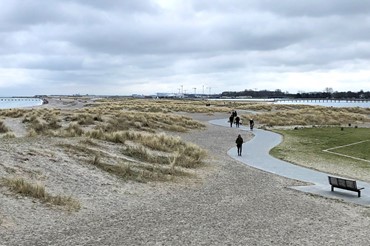
Adaptive Coastal Planning under Climate Change Uncertainty
The focus of this industrial PhD project is to investigate novel dynamic concepts for long-term coastal planning and climate change adaptation, i.e. Dynamic Adaptive Pathway Planning (DAPP), integrating knowledge from the technical, economical and climate sciences.
Project start: June 2022
Project ending: June 2025
BU/department/ industry to which the project is associated: Coastal and Offshore Engineering
Cooperation-partners: Technical University of Denmark
Due to climate change, low-lying coastal areas all over the world are increasingly threatened by flooding or even permanent inundation due to combinations of sea level rise, storm surges and other extremes, which demand urgent action.
Some coastal communities decide to live with the risk, whereas in most places, dedicated measures such as dikes, sea walls, and nature-based solutions (or combinations thereof) are installed to protect human and natural systems, including ecosystem services. Where there are limits to adaptation, a managed retreat may be the only viable solution.
The planned research will apply the current state-of-the-art through a range of case studies. This will bridge the gap between current theoretical knowledge and frameworks and the real-life needs of decision-makers, practitioners and other stakeholders.
Adaptive planning is recommended to effectively implement climate adaptation and cost-effective planning under deep climate change uncertainty. Especially in areas with a high density of people, critical infrastructure and other socio-economic assets in the coastal zone, including vulnerable ecosystems. In Denmark, DAPP methods were recently recommended by the Danish Coastal Authority.
This will lead to an increased need for the development of adaptive adaptation plans on a global scale but also within Denmark over the coming years. The project will result in an improved framework from lessons learned within the area of long-term adaptive planning in coastal environments from a multi-hazard, multi-risk perspective, including climate change.
Articles and publications
The project started before the summer 2022 and is establishing the first case study. For context please have a look at earlier work where this study builds on:
Kool, R.; Lawrence, J.; Larsen, M.; Osborne, A.; Drews, M. Spatiotemporal aspects in coastal multi-risk climate change decision-making: Wait, protect, or retreat?, Ocean & Coastal Management, Volume 258, 2024, https://www.sciencedirect.com/science/article/pii/S0964569124003703?via%3Dihub
Kool, R.; Lundov, M.; Schow, C.; Hubard, E. MANAGING UNCERTAINTIES IN URBAN DEVELOPMENT AND CLIMATE CHANGE ADAPTATION: A CASE STUDY IN ADAPTATION IN A COMPLEX COASTAL ENVIRONMENT USING DYNAMIC ADAPTIVE PATHWAYS IN SKIVE, DENMARK. (2023). Coastal Engineering Proceedings, 37, papers.32. https://icce-ojs-tamu.tdl.org/icce/article/view/12671
Kool, R.; Lawrence, J.; Drews, M.; Bell, R. Preparing for Sea-Level Rise through Adaptive Managed Retreat of a New Zealand Stormwater and Wastewater Network. Infrastructures 2020, 5, 92. https://doi.org/10.3390/infrastructures5110092
Lawrence, J.; Boston, J.; Bell, R.; Olufson, S.; Kool, R.; Hardcastle, M.; Stroombergen, A. Implementing pre-emptive managed retreat: Constraints and novel insights. Curr. Clim. Chang. Rep. 2020, 6, 66–80. https://doi.org/10.1007/s40641-020-00161-z
More about the project
Project status: Ongoing
5 main keywords about the project: Climate Change, Adaptation, Sea-level rise, Resilience, Adaptive Planning
Educational background: Civil Engineer from DTU (Msc.)
Hopes for the future works of the project: To help society, in particular coastal regions, overcome challenges brought on by climate change and navigate long-term adaptation through an uncertain future.
The importance of cooperating with NIRAS: NIRAS has a longstanding reputation in consulting in Denmark and abroad on coastal adaptation using a multi-disciplinary approach. Collaborating on this topic with the opportunity to incorporate ongoing projects as case studies is highly valuable to ensure the applicability of the research.
Reach out

